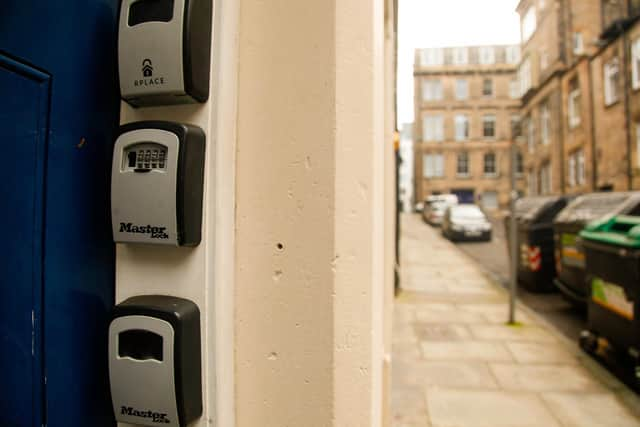Edinburgh council calls for emergency legislation in wake of court ruling on city's short-term lets policy
and live on Freeview channel 276
Edinburgh Council has called for emergency legislation to be passed by the Scottish Parliament to allow its crackdown on short-term lets to continue as planned.
A judge ruled earlier this month that the council’s planning guidance for owners of Airbnb-style holiday lets was unlawful, which could have a significant impact on the authority’s approach to regulating the sector.
Advertisement
Hide AdAdvertisement
Hide AdFollowing a judicial review at the Court of Session, Lord Braid found rules of the city-wide ‘control area’ – introduced last year in a bid to tackle high concentrations of short-term lets (STL) – could not be applied retrospectively.


As a result the council is no longer able to demand that all operators of entire-property short-term lets seek planning permission as part of their application for a licence, only those who began operating after the control area was introduced back in September 2022.
While council chiefs maintain planning permission will still be required in the vast majority of cases, the ruling means potentially thousands of applications will need to be painstakingly assessed on a case-by-case basis to test if the change of use of a property has been ‘material’.
It is understood this could stretch resources in the city’s planning department and lead to significant additional staff and enforcement costs. The council is still yet to decide whether it will appeal the judgement.
Advertisement
Hide AdAdvertisement
Hide AdA cross-party motion tabled by the council’s Labour administration with Green and Lib Dem councillors, and backed by SNP members, will now see the Scottish Government’s minister for local government Joe FitzPatrick urged to introduce an emergency bill to Holyrood. Councillors said this should “address the legislative deficiencies” in the original legislation that allowed local authorities to set up STL control areas.
Green councillor Chas Booth said the court’s decision was “good news for lawyers but bad news for communities and bad news for anyone seeking a genuinely affordable place to live”.
He said: “It’s vital the council considers whether there are grounds for appeal and if not that we approach the Scottish Government to urge them to put measures in place to allow us to effectively, clearly and quickly regulate this sector.
“The council does have powers under licensing legislation to refuse licence applications where there is a suspected breach of planning control. It’s essential we make effective use of those powers.”
Advertisement
Hide AdAdvertisement
Hide AdLabour planning convener James Dalgleish said: “As a result of our policies we’re seeing properties that were being used for STLs now moving back into residential use. That could be someone’s new home. Because of this policy we can now really tackle issues that are short-term let-related such as anti-social behaviour, which I know many of our residents are worried about.”
Conservative councillor Jo Mowat said it would be “premature to call for an emergency bill prior to getting clarity from the Scottish Government on the principle of retrospectivity” and her group voted against the move.
In an email to councillors, Fiona Campbell, CEO of the Association of Scotland’s Self-Caterers (ASSC), suggested that the council determines all existing STLs established prior to the control area coming into force are considered lawful use and won’t need planning permission.
She said this would “draw a line under current legal uncertainty and the potential for further costly appeals, disputes and potential compensation claims”.
Advertisement
Hide AdAdvertisement
Hide AdIt is understood that, on the back of the Court of Session ruling, the council has been contacted by aggrieved STL operators who have previously been refused planning permission.
However Cllr Dalgleish said having sought legal advice the council “is not liable for compensation”. Councillors have been told each claim will be looked at on their individual merit.
Several holiday hosts owners been in touch with the Local Democracy Reporting Service to say they plan to seek compensation. One said: “We received what seemed to us an unfair refusals in planning for our five properties in Edinburgh last year. We still believe strongly that our operations do not detrimentally impact on the local amenity and should not be considered a material change of use.”
Another said any operators who made planning applications based on the “now deemed unlawful actions of the council” should be able to “seek compensation for the cost of an application that wasn’t required, even if planning was actually granted”. They said: “I spent almost £3,000 on my application including planning, architect and advertising fees.”